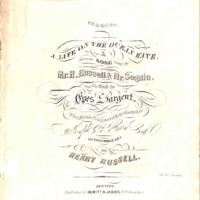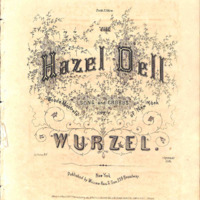Contents
Stephen C. Foster
Stephen Foster is one of America’s Greatest songwriters and composers, being the first person in the United States to make a living in the U.S. selling their compositions. His famous works include Oh! Susanna, Jeanie with the Light Brown Hair, Old Folks at Home, Swanee River, Beautiful Dreamer, and Camptown Races. He wrote music in various musical and regional styles but is best known for his vocal and piano settings. Foster's plantation songs, including My Old Kentucky Home, were and still are a point of controversy due to their degrading depictions of African Americans and use of blackface during performances. During this era performances in blackface were common in less reputable establishments such as saloons, often depicting African Americans in a degrading manner. In 1850 he met Charles Shiras, an anti-slavery advocate and poet, who greatly influenced his perspective of slavery in America.[1] The plantation songs were written over the course of the next three years, each empathetic to the abolitionist cause.
The Fugitive Slave Act, which was part of the Compromise of 1850, strengthened the divide between proslavery southerners and northern abolitionists by forcing active participation in the capture and return of fugitive slaves by federal marshals. The Fugitive Slave Act along with witnessing slave auctions, in which family members were sold to different plantation owners, inspired the 1852 publication of Harriet Beecher Stowe’s novel Uncle Tom’s Cabin. This book greatly influenced Foster’s plantation songs, with his most popular song, “My Old Kentucky Home, Goodnight,” written about the character and themes of the novel. The text of the original song depicts the separation of Uncle Tom from his family as he is taken “down the river” to be sold and his family escapes the Kentucky plantation heading north towards freedom.
In Foster’s manuscripts the chorus originally read “Poor Old Uncle Tom, Good Night,” which was eventually replaced by “My Old Kentucky Home Goodnight,” to reach a broader audience.[2] Foster wanted the white audience watching the performance to empathize with the slaves that he was depicting by asking performers to act reverently while singing.[3] Foster’s Plantation Songs were integrated into the Foster Theatre’s production of Uncle Tom’s Cabin November of 1853, which appeared “to stir up sympathy for the negro slaves, give offense to the people of the south, and bring into disrepute the institution of slavery.”[4] This was the last minstrel song that Foster produced for many years due to their association with proslavery sentiments.
In the mid nineteenth century concert saloons and music halls were being reformed of booze and scantily dressed waitresses into upstanding establishments for variety shows. One of the popular types of songs at these shows were parody songs, which took the melody of a well-known composition and would set new text to the work. While many of these songs had comedic undertones, Phil Gannon’s parody, “My Good Ould Irish Home,” depicts an Irish Immigrant who longs for his homeland.[5] During the nineteenth century the Irish were driven out of Ireland due to famine and sociopolitical hardships. As the Irish arrived in America on coffin ships, they were met with anti-Irish and anti-Catholic discrimination. Although the Irish did find a longer life expectancy and better opportunities in America, they still longed for the home they left behind. Gannon must have found similar sentiments in “My Old Kentucky Home,” inspiring him to write the parody.
| My Old Kentucky Home, Goodnight | My Good Old Irish Home |
|---|---|
|
The sun shines bright in the old Kentucky home, Chorus: They hunt no more for the possum and the coon, Chorus The head must bow and the back will bend, Chorus |
Och my heart still years for my good ould irish Home Chorus: I’ll sit no more by the bright and blazing fire Chorus Oh, my country, I love, thought it never may be free, Chorus |
[1] JoAnne O’Connell, The Life and Songs of Stephen Foster: A Revealing Portrait of the Forgotten Man behind “Swanee River,” “Beautiful Dreamer,” and “My Old Kentucky Home”, (Lanham: Rowman & Littlefield, 2016) 149 – 150.
[2] O’Connell, The Life and Songs of Stephen Foster, 161.
[3] O’Connell, The Life and Songs of Stephen Foster, 159.
[4] O’Connell, The Life and Songs of Stephen Foster, 166.
[5] O’Connell, The Life and Songs of Stephen Foster, 294.

